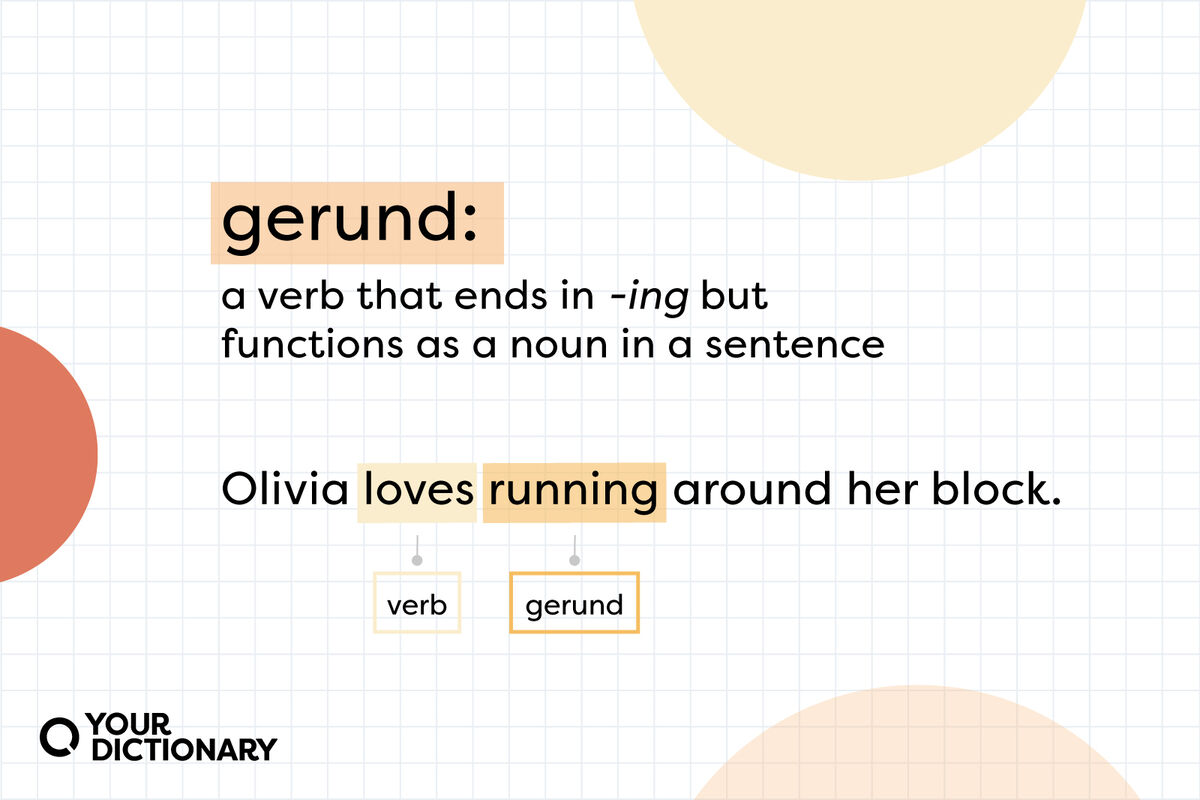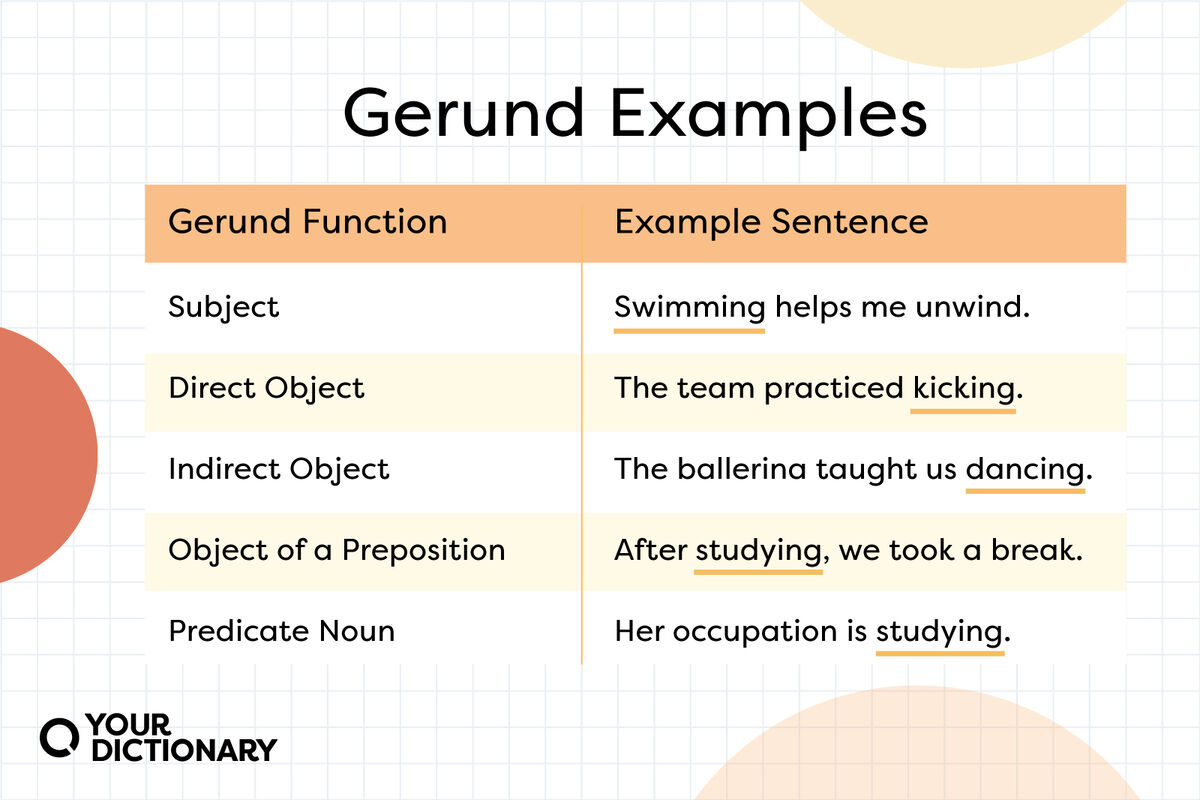
To understand what a gerund is, imagine your doorbell rings on Halloween. “Trick or treat!” yell a ghost, a vampire, and a werewolf. Why don’t you run away, screaming in terror? Because you know they’re not really scary creatures — they’re just kids dressed up in costumes so they can get candy. That’s what gerunds do: They pretend to be a different part of speech to make a sentence work. (Now hand over the candy.)
What Is a Gerund?
Gerunds (pronounced jer-unds) are verbs that end in -ing but function as nouns. They keep verb-like qualities, such as using adverbs or taking objects.
Like nouns, gerunds can function in various ways in a sentence.
- Running is Olivia’s favorite activity. (Subject)
- Olivia loves running around her block. (Direct object)
- Olivia spends her free time running. (Indirect object)
- Olivia even dreams about running. (Object of the preposition)
- Olivia’s passion is running. (Predicate noun)
Gerund phrases (phrases that begin with gerunds) can also function as nouns in a sentence. For example, in the sentence “Olivia loves running around her block,” the gerund phrase is running around her block.
How To Use Gerunds in a Sentence
Now that you know that a gerund is really just a verb dressed up as a noun (like the kid dressed up as a ghost), you’ll find them everywhere in your sentences. As long as you’re using them as nouns, you’re using them correctly.

Examples of Gerunds as Subjects
When the gerund is performing the action in the sentence, it's functioning as the subject. The gerund usually appears before the verb in these cases.
- Reading became my favorite hobby.
- Swimming helps me unwind.
- Writing is an exchange of ideas.
- Smoking impacts your lungs in a negative way.
- Apologizing seems like the right response.
Gerund phrases can also function as subjects when they perform the action.
- Reading romance novels became my favorite hobby.
- Swimming with friends helps me unwind.
- Writing with a partner is an exchange of ideas.
Examples of Gerunds as Direct Objects
When the gerund receives the action in the sentence, it’s the direct object.
- John enjoys grilling.
- My sister avoids cooking.
- The team practiced kicking.
- We don't mind paying.
- She considered quitting.
You can also use gerund phrases as direct objects when they receive the action and follow the verb.
- John enjoys grilling steaks.
- My sister avoids cooking large dinners.
- The team practiced kicking from the sideline.
Examples of Gerunds as Indirect Objects
When gerunds function as indirect objects, they receive the direct object of the sentence.
- I gave gardening another chance.
- The ballerina taught us dancing.
- My mother spent her life teaching.
- She made jogging her routine.
- Mrs. Taylor gave painting a try.
Gerund phrases can also function as indirect objects.
- I gave gardening in the backyard another chance.
- The ballerina taught us dancing to music.
- My mother spent her life teaching children.
Gerunds as Objects of Prepositions
When a gerund follows a preposition, it's an object of the preposition.
- My love for reading was immediate.
- After studying, we took a break.
- Kira is obsessed with texting.
- We got in trouble for cheating.
- Ian has received ten job offers since graduating.
Gerund phrases as objects of prepositions include:
- My love for reading novels was immediate.
- After studying for six hours, we took a break.
- Kira is obsessed with texting her friends.
Gerunds as Predicate Nouns
Predicate nouns, also known as predicate nominatives, follow a form of the verb "to be" and rename or explain the subject of the sentence. Gerunds function as predicate nouns when they provide more information about the subject of the sentence.
- Dawn's favorite activity is drawing.
- Her occupation is writing.
- The dog's worst habit is barking.
- My least favorite transportation is flying.
- His passion was biking.
Gerund phrases can also function as predicate nouns.
- Dawn's favorite activity is drawing sketches of her family.
- Her occupation is writing newspaper articles.
- The dog's worst habit is barking at the door.
Gerunds vs. Present Participles
Present participles are another type of verbal that also end in -ing, but they function as adjectives to modify nouns. Gerunds only function as nouns.
- Gerund - The girls enjoy playing with cars.
(Playing is the object of the verb enjoy) - Participle - The playing girls shared their cars.
(Playing modifies the noun girls)
- Gerund - Hiking is great exercise.
(Hiking is the subject) - Participle - The hiking family enjoyed the exercise.
(Hiking modifies the noun family)
Gerunds vs. Verbal Nouns
Are all -ing words that function as nouns gerunds? Not exactly. Verbal nouns are another type of word that’s derived from a verb, but doesn’t function as a verb.
Remember that gerunds keep verb-like qualities, such as using adverbs and taking objects. Verbal nouns function purely as nouns. If you want to describe them, you use adjectives — just like any other noun.
- Gerund - Kyle focused on carefully building the block tower.
(Building takes the block tower as an object, and is modified by adverb carefully) - Verbal noun - Kyle finished his tall block building.
(Building has no object and is modified by adjective tall)
Gerund - The film critic spends her time diligently rating movies.
(Rating takes movies as an object, and is modified by adverb diligently) - Verbal noun - Why did you give that movie such a poor rating?
(Rating has no object and is modified by adjective poor)
Sharing the Gerunds
Gerunds may seem as scary as a monster on your doorstep, but they're really just dressed up words (who may or may not want some candy). Now that you understand a bit more about gerunds, use a list of adjectives, adverbs, and gerunds to make your writing more descriptive.